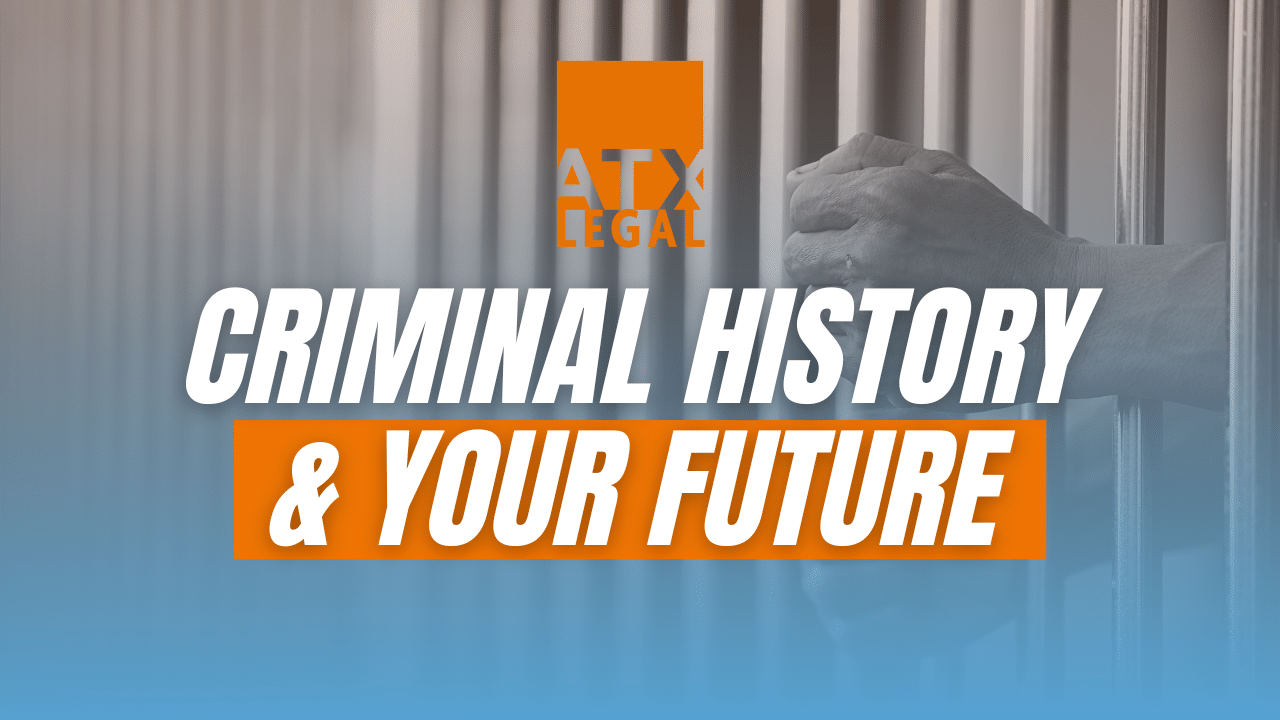How will a Texas Criminal History Affect My Future? | Austin Criminal Lawyer | ATX Legal
A criminal record in Texas, or anywhere, can have a profound impact on an individual’s future. It’s not just about the immediate penalties, like incarceration or fines, but the long-lasting consequences that can permeate several facets of life.
The societal stigma attached to criminal records can pose challenges in securing employment, housing, or even education opportunities. This is only a broad overview, and the actual repercussions can vary significantly based on the type and severity of the offense, the individual’s previous record, and the rehabilitation measures undertaken.
It’s important to have an experienced criminal defense attorney to explain the repercussions while the criminal case is still pending. If charged with a crime in Austin, Tx or if you need to have your record cleaned, Austin criminal defense attorneys can help. Fill out a contact form for a free consultation.
The Best Time to Think About Your Criminal Record is BEFORE You Plea
It’s crucial to consider the long-term implications of a criminal record before entering a plea. Often, individuals focus on immediate outcomes, overlooking how a guilty plea can significantly impact their future.
A plea bargain, while potentially reducing immediate penalties, can still result in a criminal history that haunts you for years to come. Consulting with the best criminal defense lawyers can help you understand all potential consequences, both immediate and future, and guide you in making an informed decision. Remember, a proactive approach early in the legal process can potentially reduce life-altering outcomes later on.
Employment
Perhaps one of the most impactful ways criminal defense cases can affect an individual’s future is limiting their employment opportunities. Employers often conduct background checks and may hesitate to hire individuals with a criminal record, regardless of their qualifications or skills. This is especially true for jobs in education, law enforcement, healthcare, or any other sector that requires a high level of trust or security clearance.
Moreover, certain convictions can legally bar an individual from specific professions. For example, a felony conviction may disqualify someone from obtaining a professional license in areas such as law, medicine, or teaching.
Even if employment is secured, individuals with a criminal history may face barriers to advancement, wage growth, or job stability. However, it’s important to note that there are legal protections in place to prevent discrimination, and resources available to help those with a criminal history find employment.
Always speak candidly with your criminal defense lawyer about the ramifications a conviction might have for your job and future prospects. There is often a way to mitigate the damage.
Housing
Securing stable, affordable housing can be a daunting task for individuals with a criminal history. Many property owners and rental agencies conduct background checks and may be reluctant to rent to someone with a criminal record, fearing potential risk or liability. This challenge can be even more pronounced in public housing or subsidized rental programs, as certain types of convictions can lead to disqualification.
Furthermore, having a criminal history can complicate the process of obtaining a mortgage or qualifying for housing assistance programs. It’s a formidable barrier that often leads to housing instability, with individuals either living in substandard conditions or experiencing homelessness. While certain legislations and programs are striving to mitigate these issues, the impact of a criminal record on housing remains a significant hurdle for many.

Gun Ownership
The right to own firearms is heavily regulated for individuals with a criminal history, particularly for those with felony and assault family violence convictions. In many jurisdictions, felony convictions result in an automatic prohibition on gun ownership. This ban can be permanent or temporary, depending on the nature of the felony and the laws of the relevant jurisdiction.
In the case of assault family violence convictions, the regulations can be even more stringent. The rationale behind such restrictions is to prevent potential incidents of domestic violence and ensure the safety of family members. Those with such convictions may face strict restrictions on gun ownership, sometimes extending a ban even beyond the probationary period.
While these laws aim to protect society and potentially vulnerable individuals, they can also spark debates about personal liberty and the right to self-defense. Make sure you speak with your criminal defense attorney to understand how a conviction might affect your gun ownership rights.
Travel
A criminal history can significantly impact an individual’s ability to travel, particularly when it comes to international journeys. For instance, Canada has strict policies regarding visitors with a criminal record. If individuals have been convicted of an offense, including driving under the influence (DUI), they may be deemed “criminally inadmissible” and denied entry into Canada.
This policy applies regardless of the time that has passed since the offense. To overcome this inadmissibility, the individual might have to apply for a Temporary Resident Permit (TRP) or Criminal Rehabilitation. The TRP can legally allow someone with a criminal record to enter Canada for a specific purpose and period, whereas Criminal Rehabilitation is a permanent solution, albeit with a longer processing time.
However, these applications do not guarantee entry, and the final decision lies with the Canadian immigration officials at the border. It’s a stark reminder of how a criminal history can lead to barriers in areas of life many take for granted, such as travel. If you have any dings on your criminal history and plan to travel abroad, it can save some anxiety if you consult with an experienced criminal defense attorney first.

Enhanced Charges
Having a prior criminal record can result in enhanced charges, particularly in cases involving Driving While Intoxicated (DWI) and domestic violence incidents. For instance, a first-time DWI offense might be considered a misdemeanor, but with a past record, subsequent DWI charges could be escalated to a felony. This elevation in charges often leads to harsher penalties such as longer jail sentences, higher fines, and extended probation periods.
In the context of domestic violence, a previous conviction can also lead to enhanced charges for any future offenses. The court could consider the prior offenses as aggravating factors, leading to more severe sentences and even bump a charge from a misdemeanor to a felony. This might also include longer periods of mandated counseling or anger management classes, increased community service hours, or stricter restraining orders. Penalties for domestic violence charges can be especially harsh, so having a skilled criminal defense attorney by your side is essential.
Future Interactions with Police
Interactions with law enforcement can also be substantially influenced by a prior criminal history. Law enforcement agencies have access to criminal record databases, allowing them to rapidly check a person’s background during routine stops, investigations, or other encounters. If an individual is known to have a criminal record, it might alter the way the police approach, interact with them, or interpret their actions.
In some cases, officers may exercise more caution or assume a more defensive posture. They might also be quicker to suspect criminal activity based on the person’s past, which could lead to more scrutiny, searches, or questioning. This increased caution may not necessarily stem from bias, but from a responsibility to ensure their own safety and that of the community. However, it is vital to maintain the balance and ensure that individuals with a criminal record are not unfairly targeted or subjected to prejudiced treatment.
It is also essential for individuals with a criminal record to understand that their past can influence these interactions, and so, it is of prime importance to respond respectfully and comply fully with law enforcement directives to prevent any potential escalation of the situation. Even the most experienced criminal defense attorney cannot help you when you’re on your own dealing with a police encounter.

Social Stigma
Individuals with a criminal past often face significant social stigma, which can have far-reaching effects on their lives. This stigma can even lead to difficulties forming interpersonal relationships, as many people have preconceived notions about those with a criminal past. Society’s stereotypes often depict individuals with a criminal record as dangerous, untrustworthy, or unstable, leading to their marginalization and exclusion.
In the digital age, the Internet has exacerbated this issue, making criminal records more accessible than ever before. Previously, one would need to go through formal channels to access these records, but now, thanks to the proliferation of online databases and search engines, anyone with an Internet connection can easily obtain this information.
It means that a person’s past mistakes are only a few clicks away, forever etched in the digital landscape. This openness, while in some ways promoting transparency, also presents a further hurdle for those with a criminal history as they try to move past their transgressions and reintegrate into society. It’s impossible for Austin criminal attorneys to anticipate every way in which a criminal record can affect you, but we know it’s best to avoid if possible.
How Do I Check My Criminal Record?
The most effective way to check your criminal record in Texas is by visiting the website www.identogo.com. This platform provides an array of services including personal criminal history checks. Here, you can access a comprehensive report of your background, ensuring you have full awareness of the information disclosed to employers, landlords, and other entities conducting background checks.
Staying informed about your record is the first step towards managing its impact on your life and future opportunities. Criminal defense lawyers who handle expunctions will often ask you to go to Identogo first.
Three Parts to a Criminal History in Texas
A criminal history in Texas generally comprises of three key sections.
Arrest Records: This part documents any arrests made by law enforcement, the charges filed, and whether the person was held in custody. It’s crucial to note that an arrest does not automatically translate to guilt; instead, it only indicates that the person was suspected of committing a crime.
Court Records: These are records of the proceedings in any court cases related to the charges. This includes information about the charges, the plea entered, the court’s verdict, and any sentences imposed.
Correctional Records: This final section outlines the details of any resulting incarceration or probation. It includes information about the correctional facility, the length and nature of the sentence, and details pertaining to parole or probation.
Each of these sections provides critical insights into a person’s interactions with the criminal justice system, and collectively, they constitute a comprehensive criminal history. Criminal defense attorneys will tell you that even if your case is dismissed, the court records and correctional records are still out there – unless you get them expunged.
Expungement and Record Sealing
Eligibility
Expunction and non-disclosure are legal actions that can mitigate the impact of a criminal history on one’s life, but eligibility for these actions varies. Expunction eligibility is usually only available in the case of dismissal or acquittal at trial.
For misdemeanors, the waiting period is generally two years, while for felonies, it may extend to three or more years. Non-disclosure, also known as record sealing, may be available to individuals who completed a deferred adjudication or probation, or who were convicted of certain misdemeanor offenses.
Differences between Expunctions and Non-disclosures
Expunction and non-disclosure, while similar in their aim to offer second chances and protect privacy, have distinct differences. An expunction completely erases the criminal record, as though the offense never happened, and is therefore more comprehensive in its effect. Non-disclosure, on the other hand, seals the record from the general public but certain entities, like law enforcement or state licensing agencies, may still access it.

Applying for Expunction and Non-disclosure
The process for obtaining an expunction or non-disclosure of your criminal cases often involves several steps. First, one needs to file a petition at a court in the county where the offense occurred or where the individual was arrested. This document details the specifics of the case and the requested relief.
Once filed, the court schedules a hearing where a judge evaluates the merits of the case. If the judge grants the expunction or non-disclosure, relevant agencies are ordered to erase or seal the record. Given the complexities of this process, it is typically recommended that you seek out criminal defense lawyers who can handle it for you.
Contact ATX Legal Law Firm for a Free Consultation
If you have pending misdemeanor or felony charges in Austin, Tx, or if you are seeking expunction or non-disclosure in Texas, it’s important to have experienced legal help on your side. Austin criminal defense lawyer Rob Chesnutt understand the intricacies of this complex process and can guide you through each step, ensuring your case is presented in the best possible light.
You can fill out a contact form for a free consultation regarding criminal charges. Take the first step towards a fresh start – reach out to ATX Legal today.

